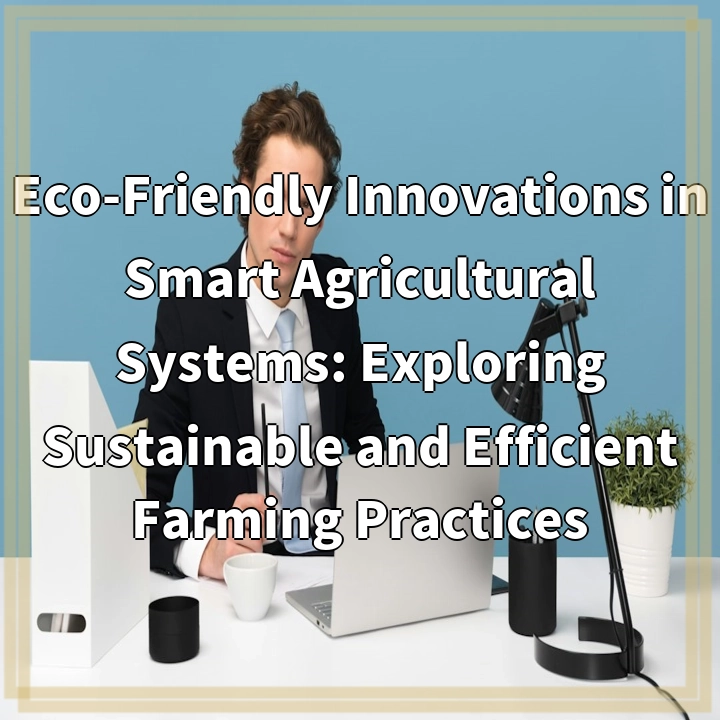
What Are Eco-Friendly Innovations in Smart Agricultural Systems?
Smart agricultural systems, also known as precision agriculture, incorporate advanced technologies and practices to optimize and enhance farming operations. These systems integrate data analytics, Internet of Things (IoT) devices, and artificial intelligence to collect and analyze real-time data about soil conditions, weather patterns, crop health, and resource usage.
By leveraging this data, farmers can make informed decisions and apply targeted interventions to maximize crop yield, minimize resource wastage, and reduce environmental impact. Eco-friendly innovations in smart agricultural systems focus on implementing sustainable and efficient farming practices that promote long-term environmental sustainability while increasing agricultural productivity.
Real-World Problems Associated with Eco-Friendly Innovations in Smart Agricultural Systems
While eco-friendly innovations in smart agricultural systems offer numerous advantages, they also face several challenges and real-world problems that need to be addressed:
1. Cost and Accessibility:
Investing in and implementing smart agricultural technologies can be expensive, particularly for small-scale farmers. The initial costs of purchasing the necessary hardware, software, and training can be prohibitive. Additionally, some farmers may lack access to reliable internet connectivity required for data collection and analysis.
2. Technical Skills and Knowledge:
The effective use of smart agricultural systems requires technical skills and knowledge. Farmers must be trained to operate and maintain the sophisticated equipment, interpret data accurately, and make well-informed decisions based on the insights gained. Lack of technical expertise can hinder the adoption and successful implementation of these technologies.
3. Data Privacy and Security:
The collection and utilization of large amounts of data in smart agricultural systems raise concerns about data privacy and security. Farmers need assurance that their data will be securely stored, and privacy regulations must be adhered to. Additionally, data breaches can have serious consequences, potentially compromising farm operations and sensitive information.
4. Compatibility and Interoperability:
With the multitude of smart agricultural technologies available, compatibility and interoperability between different systems can be a challenge. Integration and data sharing between various devices, software, and platforms may not always be seamless. This can limit the overall effectiveness and hinder the potential benefits of smart agricultural systems.
5. Environmental Impact:
Eco-friendly innovations in smart agricultural systems aim to reduce the environmental impact of farming. However, certain technological interventions, such as increased reliance on machinery or excessive use of synthetic inputs, can potentially have unintended negative consequences. Striking a balance between sustainability and productivity is essential in order to minimize ecological disruption.

Potential Solutions to Address the Real-World Problems
1. Promoting Financial Support and Incentives:
Government and non-governmental organizations can provide financial support, grants, and subsidies to help farmers offset the initial costs associated with implementing smart agricultural systems. Incentive programs can encourage farmers to adopt sustainable practices and technologies.
2. Offering Training and Education:
Training programs and workshops can be organized to enhance farmers’ technical skills and knowledge in using smart agricultural technologies. These programs can teach farmers how to effectively collect and interpret data, make informed decisions, and troubleshoot common technical issues.
3. Strengthening Data Privacy and Security Measures:
Governments and agricultural organizations must enact strict regulations and standards to protect farmers’ data privacy. Secure storage systems, encryption methods, and transparent data handling policies can enhance trust and ensure the security of sensitive information.
4. Encouraging Standardization and Interoperability:
Industry stakeholders can work together to establish common standards, protocols, and compatibility frameworks for smart agricultural technologies. This can simplify integration and data sharing between different systems, enabling a more seamless and efficient farming ecosystem.
5. Implementing Sustainable and Regenerative Practices:
Farmers can adopt sustainable and regenerative agricultural practices to mitigate the negative environmental impact. This includes reducing the use of synthetic inputs, employing precision irrigation techniques, practicing crop rotation, and promoting biodiversity on farms.















